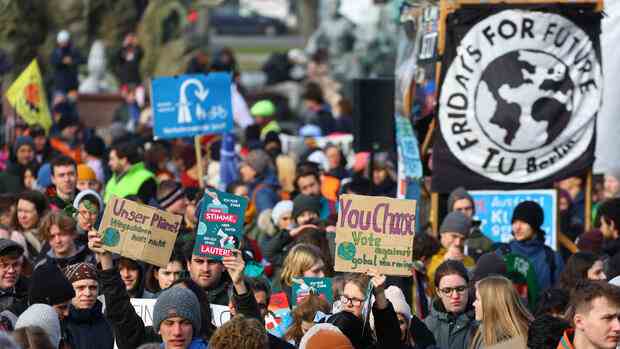At the international level, one of the key demands on politicians is to stop the financing of all oil and gas projects worldwide in order to avert the impending climate catastrophe and to meet the 1.5 degree target. What is meant is the goal agreed at the 2015 UN climate conference in Paris to limit global warming to 1.5 degrees compared to pre-industrial times.
Earth has already warmed up by about 1.1 degrees, in Germany it is even 1.6 degrees. Depending on the region, the fatal consequences are more frequent and more severe storms, droughts, floods and heat waves. The international strike call states that every dollar that flows into the financing of fossil fuels such as oil, gas and coal is “stained with blood”.
According to data from the International Energy Agency (IEA), climate-damaging subsidies, which make oil, gas and coal cheaper worldwide, have skyrocketed in the past year. Fueled by the energy crisis in the wake of the Ukraine war, subsidies broke the one trillion US dollar mark for the first time – twice as high as in 2021.
Employers accuse Verdi of illegally walking out on the climate strike
Germany’s employers have sharply criticized the warning strikes by the Verdi union in local transport on the day of the Fridays for Future climate strike. “Verdi’s announcement that it would paralyze and block traffic in large parts of Germany together with the organization Fridays for Future is a dangerous crossing of borders,” said the chief executive of the Confederation of German Employers’ Associations (BDA), Steffen Kampeter, the German press agency in Berlin.
Verdi and the civil servants’ association dbb are demanding 10.5 percent more income, but at least 500 euros more per month.
(Photo: dpa)
Kampeter said: “Strikes are allowed to achieve collective agreements that regulate working conditions.” Demonstrations could be aimed at very different goals. “But anyone who mixes labor disputes and general political goals quickly ends up on a playing field beyond our collective bargaining autonomy.” Political or even quasi-political strikes are simply illegal in Germany. Kampeter called on the German Trade Union Confederation (DGB) to “distance from this border crossing”.
The negotiations for the approximately 2.5 million federal and local employees had been tough since they started in January. Verdi and the civil servants’ association dbb are demanding 10.5 percent more income, but at least 500 euros more per month. In the second round of negotiations last week, despite an offer from the employers, there was still no rapprochement. The probably crucial third round is scheduled for the end of March. Verdi boss Frank Werneke had already said that a vote on a regular strike was “on the agenda” if the third round didn’t bring a breakthrough.
More: Federal Ministry of the Interior warns of infiltration of the climate movement
